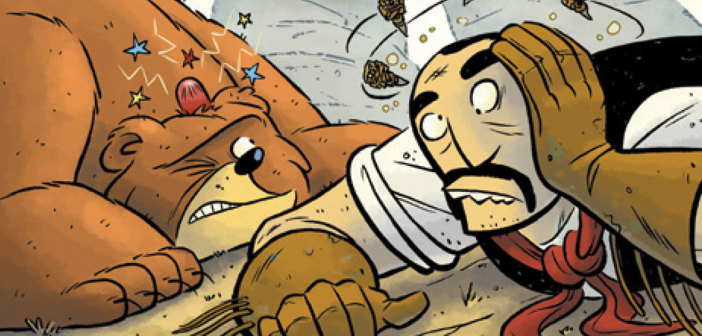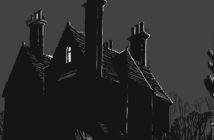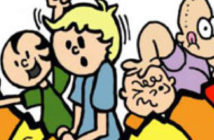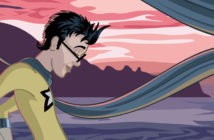Finally, here is a comic book that doesn’t take itself so seriously. There is nothing snooty or pretentious about Reed Gunther, an independent series that chronicles the adventures of a dim-witted cowboy and his faithful steed, Sterling—who, I should mention, is a bear. The book is published by the creative duo of brothers, Shane and Chris Houghton: Shane writes the stories, and Chris illustrates them. So far, the series has three issues to its name, and it’s an easy recommendation. If you like to have fun, check this book out.
Reed Gunther might be a cowboy, but there’s nothing normal about him or his wacky lifestyle. In the first issue of the series, Reed Gunther and the Steak Snacking Snake, Reed and Sterling help out a plucky rancher named Starla who is having problems with her cattle being snatched up by a rather large and nasty serpent that hides in a nearby watering hole. The story is a stand-alone comic (and can be read for free on the Houghton’s official Web site), but it sets the necessary foundation needed for future issues.
In the second installment, Reed Gunther in a Stalac-Tight Spot, Reed and Sterling find themselves caught up in a gold-hunting expedition gone terribly wrong. The discovery of a mysterious idol (which bears a ridiculous resemblance to the classic cursed idol from The Brady Bunch) triggers a chain reaction of monsters and mayhem, causing more trouble than Reed and Sterling can handle. Thankfully, Starla makes a return appearance to lend a sassy hand in the fray.
The latest issue of Reed Gunter is the strongest yet; the Houghtons are beginning to establish their firm footing here, solidifying their whimsical characters as slyly developed personalities. The adventures that take place in Reed Gunther in Trains, Reigns, and Pains continue where the second issue left off. Reed, Sterling, and Starla find themselves fighting against the clock in a railroad relay race if they hope to stop a corrupt tycoon who wishes to use the evil powers of the mysterious idol to turn a serious profit. But that’s not the only problem: monsters and demons are still popping up wherever the idol appears, and our heroes must face off against a very rotten (and very enjoyable) undead railroad spike driver. Cheers to Shane Houghton for tapping the old John Henry tall tale here, and two thumbs up are in order for Chris’ bizarre interpretation of the folk hero’s posthumous appearance.
If I sound like I’m heaping an abundant amount of praise on Reed Gunther, it’s because I am. It’s a rare find to uncover a comic book that knows what it wants to be from start to finish. Shane and Chris Houghton are certain of their vision for Reed, Sterling, and Starla, and they’re not deviating from the path they’ve set out for themselves. Shane Houghton writes the comic, and though his stories are goofy and slapstick, he understands how to structure a competent and readable plot. His characters and their relationships with one another are genuine, his dialogue is light and witty, and his adventures are exciting without being intense.
What’s interesting about Reed Gunther is that it doesn’t look like a comic book so much as it resembles a newspaper comic strip. Aside from the book’s art appearing in black and white, artist Chris Houghton ensures that all of the characters, creatures, and settings have a specific look of exaggeration to them, which gives Reed Gunther not only a unique visual experience, but also a special narrative flavor.
I’ve never seen it for myself, but I’ve been told that Bill Waterston, the creator of the timeless Calvin and Hobbes comic strip, once illustrated a cartoon mocking the medium’s morose infatuation with bleak and gloomy stories and artwork that follow in the footsteps of Alan Moore’s Watchmen and Frank Miller’s The Dark Knight Returns. Perhaps this is why I enjoyed Reed Gunther so much: it’s screwy, zany, and a bit childish—yes—but it’s also fresh, unique, and certain of itself. And most important, it had the courage to crack a poop joke at the expense of Sterling in the third issue, which I am still chuckling over.
This comic book review originally appeared on Broken Frontier on 22 January 2010.




